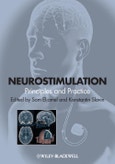Could neurostimulation be a management option for your patients?
Neurostimulation techniques present real management options for patients with a range of neurologic and psychiatric disorders, such as movement disorders, pain, and depression. They should be actively considered when conventional medical approaches have failed or are inappropriate. But for many clinicians, these new methods pose many questions. What are the available modalities? How do they work? Which patients might benefit from them? How do I explain the processes to patients? How do I monitor my patient’s progress after implantation?
Neurostimulation: Principles and Practice provides a concise, easy-to-read fusion of the clinical applications of implanted neurostimulators. It demystifies selection and referral criteria, maximizing therapy, programming the implanted neuromodulators, monitoring progress, and troubleshooting problems associated with neurostimulation.
Neurostimulation: Principles and Practice covers the modalities available for your patients:
- Deep brain stimulation
- Motor cortex stimulation
- Vagus nerve stimulation
- Spinal cord stimulation
- Peripheral nerve stimulation
Written by an international cast of experts, Neurostimulation: Principles and Practice sets the stage for you to provide real clinical benefit to your patients who might receive, or are already using, neurostimulators.
Table of Contents
List of Contributors viii
Preface xi
Part 1 Deep Brain Stimulation 1
1 Deep Brain Stimulation: Mechanisms of Action 3
Erwin B. Montgomery Jr.
2 Overview of Deep Brain Stimulation Components 20
Sam Eljamel
3 Deep Brain Stimulation in Parkinson’s Disease: Subthalamic Nucleus 26
Manish Ranjan and Christopher R. Honey
4 Deep Brain Stimulation in Parkinson’s Disease: Pallidal (globus pallidus pars interna) 37
Yasuaki Harasaki and Steven Ojemann
5 Deep Brain Stimulation of the Pedunculopontine Nucleus for Parkinson’s Disease 44
Aviva Abosch and Amit Goyal
6 Deep Brain Stimulation in Tremor 54
Antonios Mammis and Michael Schulder
7 Deep Brain Stimulation in Dystonia 63
Ludvic Zrinzo
8 Deep Brain Stimulation in Epilepsy 72
Michael G. Kaplitt
9 Deep Brain Stimulation in Obsessive Compulsive Disorders 82
David Christmas and Loes Gabriëls
10 Deep Brain Stimulation in Treatment of Refractory Major Depression 89
Clement Hamani and Paul E. Holtzheimer
11 Deep Brain Stimulation in Pain Syndromes 97
Alexander Green
12 Deep Brain Stimulation in Cluster Headache 104
Giovanni Broggi, Giuseppe Messina, and Angelo Franzini
Part 2 Vagus Nerve Stimulation 109
13 Mechanism of Action and Overview of Vagus Nerve Stimulation Technology 111
Sam Eljamel
14 Vagus Nerve Stimulation in Epilepsy 121
Ian Morrison
15 Vagal Nerve Stimulation in Treatment of Refractory Major Depression 131
Christine Matthews, Serenella Tolomeo, and Keith Matthews
Part 3 Motor Cortex Stimulation 143
16 Mechanism of Action and Overview of Motor Cortex Stimulation Components 145
Sam Eljamel
17 Motor Cortex Stimulation in Refractory Pain 148
Giovanni Broggi, Giuseppe Messina, Roberto Cordella, and Angelo Franzini
Part 4 Spinal Cord Stimulation 155
18 Mechanism of Action and Overview of Spinal Cord Stimulation Components 157
Sam Eljamel
19 Spinal Cord Stimulation in Failed Back Surgery Syndrome 162
Gail Gillespie and Pravin Dandegaonkar
20 Spinal Cord Stimulation in Complex Regional Pain Syndrome 174
Eduardo Goellner and Konstantin V. Slavin
21 Spinal Cord Stimulation in Other Indications 184
Konstantin V. Slavin and Sam Eljamel
Part 5 Peripheral Nerve Stimulation 197
22 Peripheral Nerve Stimulation in Head and Face Pain 199
Konstantin V. Slavin, Serge Y. Rasskazoff, and Sami Al-Nafi
23 Peripheral Nerve Stimulation in Pain of the Body and Extremities 210
Konstantin V. Slavin, Sami Al-Nafi , and Serge Y. Rasskazoff
Appendix I: Principles of Programming of Neurostimulators 219
Sam Eljamel, Patrick Carena, and Catherine Young
Appendix II: Troubleshooting Malfunctioning Neurostimulators 222
Sam Eljamel
Index 231
Colour plate section to appear between pages 84 and 85








